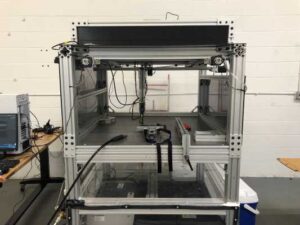Anglophone East Africa is home to over 400 million people, with half under 25. The region happens to be one of the fastest-growing globally; nevertheless, over 200 million people in East Africa do not have access to a bank account or mobile money.
But for those who do they risk facing inflation, a regional issue that affects how they save and preserve wealth. The average East African currency, for instance, is said to depreciate 20% per annum. And just today, the Sudanese pound weakened 19% against the dollar from 445 pounds to 530.
Bloom — not to be confused with the Robinhood-like app for teenagers in the US — is a fintech attempting to help Sudanese hedge against this rising devaluation. Its offers a “high-yield” savings account, free FX and adjacent digital banking services so customers can save in a stable currency, the dollar, and spend-as-they-go in local currencies.
The company was founded by Ahmed Ismail, Youcef Oudjidane, Khalid Keenan and Abdigani Diriye in late 2021. As managing partner at Class 5 Global, a San-Fransisco venture fund that has backed startups like Careem and Meliuz, Oudjidane was central to the VC’s efforts in assessing investment opportunities across emerging markets.
At some point, Ismail, who is Sudanese by descent, partnered up with Oudjidane, Algerian by descent, to scout more investments in Africa. Upon carefully studying different models pioneered by digital-first banks such as TymeBank, Kuda, FairMoney, they saw a big gap for building a savings product that helps solve what they think is the biggest problem facing African consumers: inflation and currency devaluation.
“The problem that we think is most pervasive is consumers’ inability to protect the value of their wealth. So we decided to build a business that does exactly that, that helps people save money in the stable currency and spend as they go in local currencies,” Ismail, the company’s chief executive, told TC on a call.
They brought on CTO Keenan and CPO Diriye, both of who also have roots in eastern Africa, to join the project. The quartet graduated from Russell Group universities and, alongside early joiners, have worked at Amazon, Meta, IBM, Uber, Goldman Sachs and Barclays.
Further market research highlighted that East Africa was the perfect place for the team to start. And more importantly, from Sudan. But the Northeastern country doesn’t seem to have an active tech ecosystem, let alone a vibrant one. The country witnessed its first foreign investment only last year when Fawry backed fintech Fawry e-commerce player Alsoug after 30 years of international sanctions.
So why Sudan? “We think the right way to build a business is to go after the largest opportunity first. So Sudan is interesting for three reasons. It’s a very large economy and I believe in 2015, it was Africa’s fifth-largest economy,” Ismail responded.
“We know it has had some economic challenges since then after the secession of South Sudan. Yet, purchasing power and consumer spending is still amongst the highest on the continent per capita. And most importantly, it’s probably Africa’s most under-invested country from a VC funding perspective and the most important dynamic I think about Sudan is it’s a friendly place to do business,” explained the CEO on why his firm chose to launch from Sudan first.
Bloom works with the Export Development Bank, a partner bank that handles deposits. And the best way to think about Bloom is that it is a technology, customer acquisition, user experience and marketing partner to the Bank.
The company, still in stealth, says it offers fee-free accounts for users to save in dollars and buy and spend Sudanese pounds. It also provides local and dollar cards and a feature where they can receive remittance free of charge from several countries globally, mainly from where most Sudanese diaspora reside.
“People don’t hold Sudanese pounds, they typically either buy dollarized assets like real estate, or they buy land or physical US dollars,” Ismail said. “What we’re offering people is the ability to tokenize that. And in small amounts of money, you’ll be able to hold value, as opposed to needing to save up huge amounts to buy an apartment or a plot of land.”
More than 15,000 people have signed up on Bloom’s waitlist put out three weeks ago. The founders say Bloom will begin to onboard them this month while touting its <$1 CPS marketing efforts. For now, users can only receive money; however, the company is working on letting them run outflows later when it builds up sufficient inflows and volumes to create liquidity.
Today, Bloom is announcing that it is part of Y Combinator’s Winter 2022 startup batch after receiving early admittance last July. The company, which only launched last week from stealth, raised a pre-seed in September from Global Founders Capital, Goodwater Capital and some football players, including Blaise Matuidi.
The Sudanese- and San Fransisco-based startup plans to expand across the Anglo East African region like Ethiopia, Kenya, Rwanda, Tanzania and Zambia and ammunition coming from an imminent seed round will oversee that process. Competition might brew with fintechs offering similar services in some markets, such as Fingo, another YC-backed company; Koa and Finclusion.
“We are from the region. We understand the nuances in our markets and can navigate what may appear to be an ambiguous landscape. We are also comfortable–perhaps even thrive–working in markets that are volatile. We are underwiring the next decade of growth in Africa”, said CPO Diriye.







![Read more about the article [Techie Tuesday] From Hotmail to now Showreel, why Sabeer Bhatia believes there is more than one way to solve a problem](https://blog.digitalsevaa.com/wp-content/uploads/2022/03/TT-FInalimage-1647849951874-300x150.jpeg)


